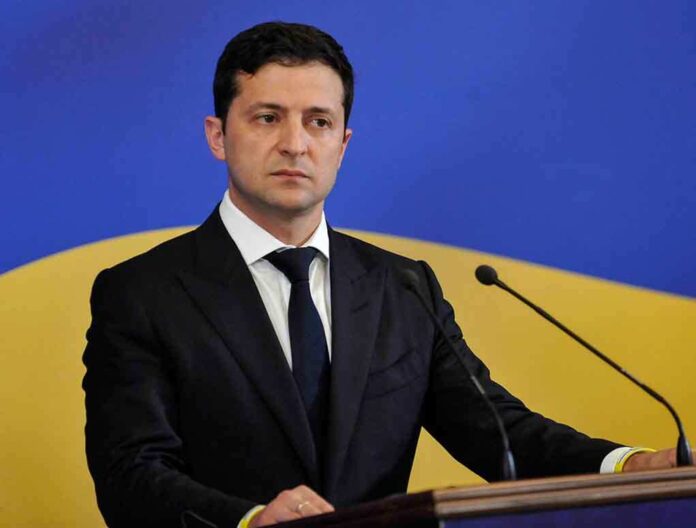
President Zelenskyy’s demand for President Trump to impose “strong new sanctions” against Russia reveals Ukraine’s desperate strategy as peace talks falter and Moscow continues to reject even a temporary ceasefire in the ongoing conflict.
Key Takeaways
- President Zelenskyy is urging President Trump to implement a “strong new package” of sanctions targeting Russian energy, banks, and the financial sector if upcoming peace talks in Istanbul fail.
- Russia has rejected Ukraine’s proposed 30-day ceasefire and continues making maximalist demands while calling for a halt to Western military support.
- President Trump has indicated the U.S. is assessing Putin’s seriousness about ending the war but has withheld new sanctions while pursuing a potential peace deal.
- Zelenskyy emphasized that Russia should not have veto power over NATO decisions, highlighting tensions over alliance expansion.
- Ukrainian and Russian delegations are set to meet in Istanbul, though observers remain skeptical about breakthrough possibilities.
Ukraine Pushes for Stronger Economic Pressure on Russia
Ukrainian President Volodymyr Zelenskyy has called on President Donald Trump to impose stronger economic sanctions against Russia as a critical measure to force Moscow to agree to a comprehensive ceasefire. During a summit of the Bucharest Nine and Nordic leaders in Vilnius, Zelenskyy emphasized the need for decisive action if upcoming peace talks in Istanbul fail to produce meaningful results. His request specifically targets Russian energy exports, oil tankers, banking institutions, and other financial sector entities that continue to fund Russia’s war machine.
Zelenskyy’s appeal comes after Russia declined Ukraine’s proposed 30-day halt to hostilities, dismissing it as insufficient. Instead, Moscow offered a limited two- or three-day partial ceasefire, which the Ukrainian president described as merely a “game of rhetoric” rather than a serious peace proposal. This rejection has strengthened Zelenskyy’s conviction that only increased economic pressure will bring Russia to negotiate in good faith.
Trump’s Calculated Approach to Russian Sanctions
President Trump has taken a measured approach to implementing new sanctions against Russia, indicating that the United States would soon assess Russian President Vladimir Putin’s seriousness about ending the conflict. While Trump has promised strong sanctions if necessary, he has also expressed caution about derailing potential peace negotiations. “If I think I’m close to getting a deal, I don’t want to screw it up by doing that,” Trump said, as reported by the Kyiv Independent.
“If the Istanbul meeting brings nothing, that clearly means strong new sanctions are urgently needed — from the EU’s 18th package, and from the United States specifically, the strongest sanctions President Trump promised,” stated Zelenskyy, President of Ukraine.
This strategic patience demonstrates Trump’s focus on achieving tangible results rather than simply applying punitive measures. The administration appears committed to giving diplomatic channels a chance to work before escalating economic pressure on Moscow. However, Zelenskyy’s urgency suggests Ukraine fears that without additional leverage, Russia will continue to make unreasonable demands and prolong the conflict indefinitely.
Peace Talks Amid Persistent Russian Demands
The upcoming peace talks in Istanbul face significant challenges as Russia has yet to submit a formal memorandum for negotiations and continues to demand that Western nations halt military support for Ukraine. This stance has been a consistent Russian position throughout the conflict, aimed at weakening Ukraine’s defensive capabilities while maintaining military pressure. Observers remain skeptical about the prospects for a breakthrough, given Russia’s history of making maximalist demands in previous negotiation attempts.
“One of the key principles of European security is that Russia must not have veto power over NATO decisions or influence over the allies or its members,” emphasized Zelenskyy, President of Ukraine.
Ukraine’s proposal includes not only a 30-day ceasefire but also demands the return of Ukrainian children deported to Russia during the conflict. This humanitarian aspect of the negotiations highlights the multifaceted nature of the conflict beyond mere territorial disputes. The upcoming NATO summit is expected to deliver a message of strength and unity, potentially reinforcing Western resolve in supporting Ukraine while pursuing diplomatic solutions.
Regional Security and NATO’s Role
During the Bucharest Nine summit, Zelenskyy expressed gratitude for transatlantic alliance support while emphasizing the crucial role of continued U.S. backing under President Trump’s leadership. He explicitly rejected any notion that Russia should have influence over NATO decisions, particularly regarding alliance enlargement. This stance reflects Ukraine’s determination to maintain its sovereignty and freedom to pursue Western integration, regardless of Russian objections.
The conflict has broader implications for European security architecture, with NATO’s eastern flank countries particularly concerned about Russian aggression. Zelenskyy’s call for stronger sanctions represents not just Ukraine’s immediate needs but also the interests of regional security partners who view a clear resolution to the conflict as essential for long-term stability. As peace talks proceed with uncertain prospects, the effectiveness of economic pressure remains a critical variable in determining whether Russia can be compelled to engage in meaningful negotiations.












